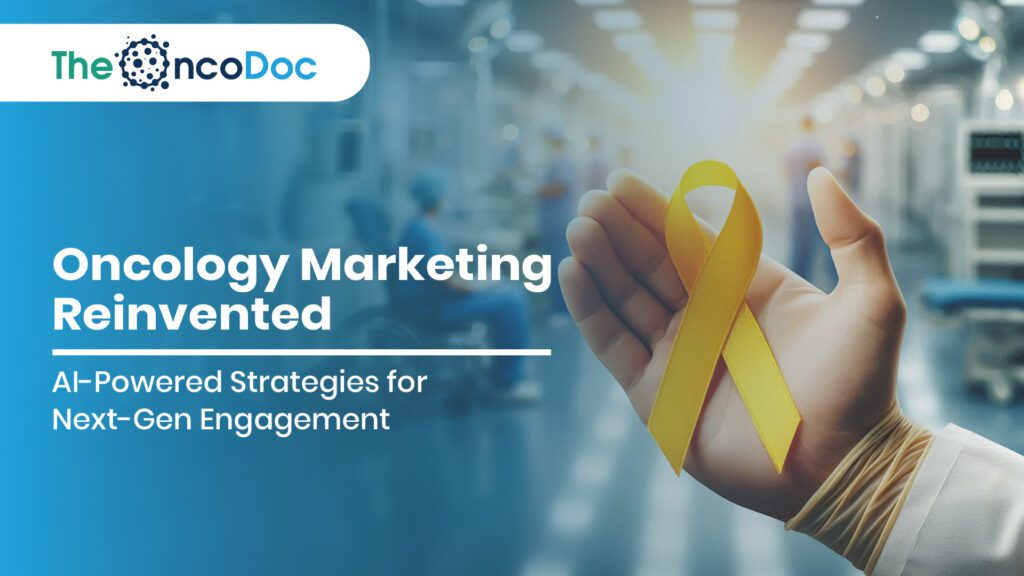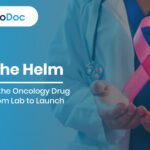Introduction: The New Era of Oncology Commercialization
Oncology commercialization has moved far beyond traditional sales-driven approaches, evolving into a data-first, patient-centered ecosystem. Pharmaceutical companies are shifting from product promotion to building trust-based engagement platforms that prioritize education, emotional support, and actionable healthcare pathways. With increasing competition from targeted therapies, biosimilars, and advanced immuno-oncology treatments, true differentiation now relies on AI-driven precision strategies that personalize every interaction and deliver measurable value.
AI is reshaping every step of the oncology journey by enabling marketers to analyze vast datasets, predict market needs, and create emotionally intelligent campaigns tailored for both patients and healthcare professionals (HCPs). This transition reflects a growing emphasis on human-centered storytelling, ensuring communication resonates culturally while maintaining clinical accuracy.
In this article, we examine how artificial intelligence (AI) is revolutionizing oncology commercialization methods by enabling hyper-personalized communications, providing doctors with real-world evidence (RWE), and bridging the awareness-to-action divide. From AI-powered gamification and wearable health insights to precision-driven HCP engagement, these innovations are redefining the future of pharma marketing. The brands that integrate advanced analytics, cultural intelligence, and emotional resonance into their commercialization models will not only gain market leadership but also play a pivotal role in improving patient outcomes worldwide.
1. The Rise of AI in Commercial Strategy
Artificial Intelligence is revolutionizing oncology commercialization, moving pharma marketing from static, one-size-fits-all campaigns to dynamic, adaptive strategies. By leveraging AI-powered analytics, marketers can process massive volumes of health data, prescribing behavior, and digital engagement patterns to anticipate both patient needs and physician interests with remarkable precision.
Key AI capabilities include:
- Predicting therapeutic demand and market changes using real-time analytics.
- Mapping disease prevalence by analyzing insurance claims, lab records, and diagnostic data.
- Automating highly personalized content delivery for patients, caregivers, and healthcare professionals (HCPs).
This data-driven transformation enables pharma companies to streamline commercialization efforts, ensure messaging relevance, and proactively address evolving market needs. AI has become a critical driver of launch excellence, reducing time-to-market, improving resource allocation, and enhancing educational engagement. By embedding AI intelligence at the core of strategy, brands are positioning themselves as innovative, trusted partners in oncology care.
2. Hyper-Personalization: From Segments to Precision Personas
Traditional demographic-based segmentation is being replaced with AI-generated precision personas. These personas incorporate emotional tone, digital behavior, and socio-cultural insights.
Examples:
- “The Fearful First-Timer” who avoids oncology clinics due to stigma.
- “The Knowledge-Seeker” who engages heavily with medical literature.
- “The Silent Supporter” caregiver who manages follow-up reminders.
By understanding emotional triggers, pharma brands deliver campaigns that comfort, inform, and inspire action, increasing engagement rates by over 40%.
3. The New Storyteller: Gen AI for Narrative Medicine
Generative AI (Gen AI) is redefining storytelling in oncology commercialization, transforming complex scientific data into empathetic, patient-focused narratives. By leveraging AI-driven creativity, pharma brands are creating communication materials that educate while building emotional connections.
Key applications of Gen AI include:
- Developing simplified, visually rich brochures with AI-generated illustrations to explain therapies clearly.
- Producing culturally relevant videos in regional dialects, ensuring resonance across diverse populations.
- Designing interactive, child-friendly storyboards for pediatric oncology to reduce fear and anxiety for young patients and their families.
This shift from technical content to emotionally intelligent communication ensures patients feel valued and supported throughout their cancer journey. Rather than being perceived as marketing material, these AI-generated narratives humanize oncology education, strengthen trust, and foster brand loyalty. Gen AI empowers pharma companies to bridge the gap between data-heavy science and compassionate storytelling, making healthcare messaging more accessible and impactful.
4. Digital Companions: 24/7 Patient Engagement
Virtual assistants and chatbots powered by AI are revolutionizing oncology interaction. These “digital companions” provide:
- Emotional support by analyzing tone and mood.
- Instant responses on drug dosage, appointments, and insurance.
- Continuous check-ins during chemotherapy cycles, reducing hospital call center load by 35%.
These companions transform pharma into a care partner, not just a supplier.
5. Gamification to Drive Awareness
Gamification strategies make cancer awareness interactive and enjoyable. AI curates challenges that resonate with different demographics:
- To raise awareness of vaccinations, teens are given mobile health challenges (HPV).
- Communities participate in district-wide screening contests.
- Digital badges reward regular health check-ups.
Gamification transforms oncology awareness into a movement by increasing involvement by 25–30%.
6. Wearable Tech and Oncology Prevention
AI-powered wearable technology is transforming oncology prevention by turning everyday health tracking into proactive cancer risk monitoring. These smart devices collect continuous lifestyle and biometric data, enabling early intervention and awareness.
Key innovations include:
- Smartwatches that identify irregular patterns such as unexplained weight loss or abnormal heart rates.
- Fitness trackers that flag prolonged inactivity, a potential contributor to cancer risk factors.
- Integrated health apps delivering AI-driven alerts, personalized recommendations, and preventive care reminders to encourage timely screenings.
By merging wearable data with AI analytics, oncology marketers can shift strategies from generic health messaging to precision prevention campaigns. This empowers patients to play an active role in their own health, while pharma brands position themselves as partners in care rather than product promoters. Pilot studies indicate this approach has the potential to reduce late-stage cancer detection by up to 15%, reinforcing the importance of early intervention.
7. Data-Driven Market Forecasting
Achieving commercial success in oncology today depends on the ability to predict market trends and therapy demand with precision. AI-powered forecasting equips pharma companies with actionable insights by integrating multiple data sources into a unified strategy.
Key forecasting enablers include:
- Genomics research pipelines, providing early visibility into emerging therapy needs.
- Regional diagnostic patterns, revealing geographical variations in cancer prevalence.
- Real-world evidence (RWE) from hospitals, offering a deeper understanding of treatment effectiveness and patient outcomes.
This intelligence-driven approach allows brands to optimize drug supply chains, preventing shortages while minimizing waste. It also helps design tailored physician education campaigns, ensuring HCPs receive content aligned with their practice demographics. Furthermore, marketing investments become highly targeted and cost-effective, focusing resources where they will deliver the greatest impact. By harnessing AI, pharma leaders transform forecasting from reactive planning into a strategic growth engine for oncology commercialization.
8. Evidence-First Physician Marketing
Physicians increasingly distrust overly promotional campaigns. AI-driven RWE storytelling is the solution:
- Data visualizations show predicted adverse event risks.
- Comparative studies simplify decision-making between therapy options.
- Evidence-based marketing positions pharma as a knowledge partner.
Trust-building through transparency is becoming a key commercial differentiator.
9. Tailored HCP Outreach with AI
AI is transforming how pharma brands engage oncology specialists by delivering hyper-personalized education and resources.
Key strategies include:
- Custom dashboards that analyze prescribing behavior to deliver relevant content.
- AI-curated scientific updates tailored to an oncologist’s research focus and trial participation.
- Distribution of CME modules via preferred platforms, from WhatsApp notifications to immersive AR-based workshops.
This level of personalization ensures that every interaction is timely, relevant, and impactful, significantly improving knowledge retention and driving deeper engagement. Studies show AI-driven outreach boosts HCP interaction rates by up to 50% compared to traditional, generic campaigns.
10. Precision Launch Campaigns
Pharma launches are now micro-targeted. AI identifies “early adopter physicians” in oncology, ensuring that critical therapy updates reach influential prescribers first.
Example:
A leading pharma brand used AI to map oncology conferences and social media activity, identifying 150 oncologists who drove 70% of regional adoption.
11. Localization and Cultural Sensitivity
Cultural relevance is becoming a cornerstone of effective oncology commercialization, ensuring that campaigns resonate deeply with diverse patient communities. Instead of broad, generic outreach, AI-powered insights enable highly localized initiatives that reflect regional preferences, traditions, and language.
Key approaches include:
- Developing region-specific cancer awareness content in languages like Assamese, Tamil, or Marathi to enhance accessibility and comprehension.
- Organizing festival-themed screening drives that integrate health check-ups into community celebrations, reducing fear and stigma.
- Partnering with local NGOs and grassroots organizations to build trust and amplify messaging.
This hyperlocal strategy establishes a sense of relatability and cultural alignment that mass marketing often fails to deliver. By respecting cultural nuances and tailoring communication, pharma brands can drive greater participation, encourage early screenings, and improve patient outcomes. Localization is no longer a creative choice but a strategic necessity in building lasting connections within oncology care ecosystems.
12. Integrated Digital Marketing Ecosystems
AI is revolutionizing oncology marketing by centralizing engagement across multiple platforms, ensuring patients and HCPs receive consistent, relevant messaging wherever they interact.
Key initiatives include:
- Personalized WhatsApp reminders that encourage follow-ups and boost screening adherence.
- Targeted LinkedIn campaigns delivering trial updates and scientific insights to oncologists.
- Emotive Instagram reels showcasing survivor stories to inspire trust and awareness.
This AI-driven ecosystem creates a seamless brand experience, reducing message fatigue while strengthening impact. By unifying digital touchpoints, pharma companies establish themselves as trusted healthcare partners, driving engagement and improving both patient education and physician outreach effectiveness.
13. Real-Time Sentiment Analysis
AI scans social media conversations and patient forums to detect sentiment trends. Campaign messaging is adapted based on:
- Fear-driven discussions needing reassurance content.
- Misconceptions prompting myth-busting campaigns.
- Success stories encouraging motivational narratives.
Sentiment-driven insights ensure empathy-led communication.
14. Predictive Patient Journey Mapping
AI is revolutionizing oncology care by identifying critical drop-off points in the patient journey, helping pharma brands create timely interventions.
Key insights include:
- Detecting missed screenings linked to financial constraints or lack of access.
- Identifying insurance-related confusion, which delays diagnostic and treatment decisions.
- Recognizing anxiety-driven hesitation, allowing for targeted emotional support campaigns.
By mapping these barriers in real time, pharma companies can deliver personalized guidance, financial assistance resources, and empathetic communication at crucial moments. This proactive approach significantly enhances engagement, boosting adherence and early intervention rates by up to 40% in oncology care pathways.
15. Oncology Digital Twins for Marketing
AI builds digital twins of patient profiles, simulating treatment responses. Marketers use these insights to design:
- Personalized brochures with expected therapy outcomes.
- Virtual explainer sessions for families.
- Risk-based messaging that feels credible, not overwhelming.
16. Strategic Partnerships with Tech Companies
AI-driven commercialization thrives on partnerships:
- Tech startups provide AI models for patient profiling.
- Telemedicine platforms collaborate for integrated care delivery.
- Insurance companies partner on predictive cancer-risk modeling.
These alliances accelerate commercial success and impact.
17. AI-Powered Clinical Trial Recruitment
Pharma struggles with trial recruitment diversity. AI solves this by:
- Scanning EHRs for eligible participants.
- Matching based on location, demographics, and genetics.
- Delivering multilingual trial invites to marginalized groups.
This reduces recruitment time by up to 50%.
18. Emotional AI in Campaign Design
Emotional AI analyzes facial and voice cues during awareness campaigns to test emotional resonance. This ensures:
- Videos evoke empathy, not fear.
- Patient brochures comfort rather than overwhelm.
- Brand perception improves through compassion-driven messaging.
19. Next-Gen Patient Support Programs
AI enables scalable support systems:
- Symptom management apps that provide nutrition advice.
- Personalized reminders for oral chemo adherence.
- AI triage that predicts emergency hospital visits.
Support programs become key brand differentiators, strengthening loyalty.
20. Oncology Knowledge Graphs for Sales Teams
AI-driven oncology knowledge graphs equip sales teams with real-time, actionable intelligence to enhance engagement and strategy.
Key features include:
- Instant access to drug interaction data for accurate, informed discussions.
- Regional cancer statistics enabling hyperlocal and targeted campaign planning.
- Behavioral analytics of physicians to refine detailing and outreach approaches.
These insights empower sales teams to deliver smarter, data-backed interactions, improving credibility, personalization, and commercial effectiveness in highly competitive oncology markets.
21. Future-Proof Digital Ecosystems
The future of oncology commercialization lies in:
- AI-powered predictive disease mapping.
- Emotionally intelligent storytelling.
- Voice-first patient engagement tools for low-literacy regions.
Pharma brands adopting these models will dominate commercial oncology landscapes by 2030.
Conclusion
Oncology commercialization has transitioned from push marketing to precision engagement. AI empowers pharma companies to anticipate patient needs, personalize HCP education, and deliver culturally sensitive campaigns. The future of oncology marketing will be defined by trust, empathy, and data intelligence rather than aggressive promotion.
With Gen AI, emotional AI, wearable integration, gamification, and predictive analytics, pharma can achieve unprecedented impact, reducing late detection rates, improving therapy adherence, and strengthening brand trust.
The leaders of tomorrow will not just sell therapies, they will save lives through intelligence-driven marketing ecosystems.
The Oncodoc team is a group of passionate healthcare and marketing professionals dedicated to delivering accurate, engaging, and impactful content. With expertise across medical research, digital strategy, and clinical communication, the team focuses on empowering healthcare professionals and patients alike. Through evidence-based insights and innovative storytelling, Hidoc aims to bridge the gap between medicine and digital engagement, promoting wellness and informed decision-making.



